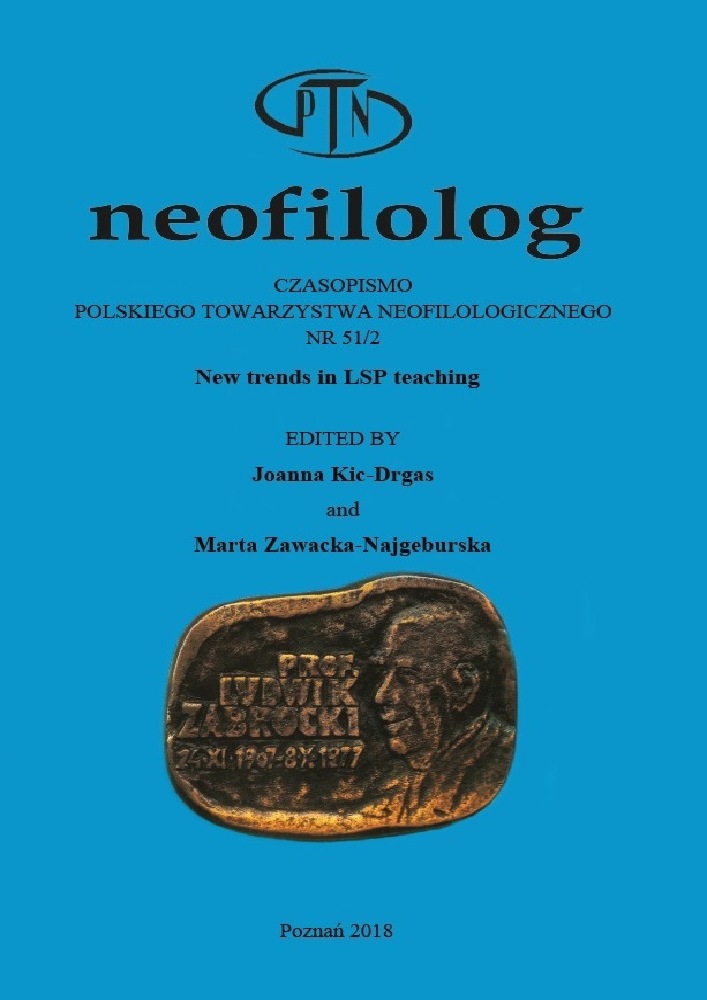Résumé
Not often do we encounter a specialized foreign language course at a university humanities department. However, why should foreign language students not be provided with practical knowledge which may be useful in future professional life? The article presents an experiment conducted with the participation of MA students of German studies at Warsaw University. The aim is to teach language skills, as well as convey professional knowledge in the CLIL formula, which is becoming more and more popular. It is consistent with requests of students themselves. Logistics is a useful introduction to various branches of the economy. Considering that the German language is becoming more and more important in business-related professions, the topics discussed in this course may be required in logistics, forwarding and other areas. In addition to traditional logistics topics, such as transport, storage and waste disposal, we also discuss topics such as business correspondence or negotiations and practice translations.
Références
Buhlmann R., Fearns A. (2000), Handbuch des Fachsprachenunterrichts: Unter besonderer Berücksichtigung technischer Fachsprachen. Tübingen: Narr Studienbücher.
Fortmann K.M., Kallweit, A. (2000), Logistik. Klausur Intensiv Training BWL. Stuttgart: Kohlhammer Verlag.
Held M. (2015), Czego pragnie pracodawca? Czyli rzecz o wymaganiach wobec pracowników i kandydatów w dziedzinie języków obcych oraz umiejętności komunikacyjnych (in) Srebro M., Typek E., Zielińska L. (Hrsg.), Przyszłość nauczania języków obcych na uczelniach wyższych. Kraków: Uniwersytet Ekonomiczny, S. 71-80.
Fluck H-R. (1998), Fachsprachen und Fachkommunikation. Heidelberg: Gross.
Gajewska E., Sowa M. (2014), LSP, FOS, Fachsprache..., Dydaktyka języków specjalistycznych. Lublin: Werset.
Parczewski P. (2015), Dekonstrukcja Krajowych Ram Kwalifikacji – krytyczna analiza wpływu Krajowych Ram Kwalifikacji na poprawę jakości nauczanai języków obcych w polskich szkołach wyższych (in) Srebro M., Typek E., Zielińska L. (Hrsg.). Przyszłość nauczania języków obcych na uczelniach wyższych. Kraków: Uniwersytet Ekonomiczny, S. 81-96.
Sowa M. (2015), Ewolucja programu kształcenia na filologii romańskiej w swietle wyzwań rynku pracy i Krajowych Ram Kwalifikacji (in) Srebro M., Typek E., Zielińska L. (Hrsg.). Przyszłość nauczania języków obcych na uczelniach wyższych. Kraków: Uniwersytet Ekonomiczny, S.111-122.
Strzelecka G. (2015), Wirtschaftsdeutsch für Germanistikstudenten: eine Gratwanderung zwischen Praxis und Ideal (in) Srebro M., Typek E., Zielińska L. (Hrsg.), Przyszłość nauczania języków obcych na uczelniach wyższych. Kraków: Uniwersytet Ekonomiczny, S.123–124.
Strzelecka G. (2017), Wirtschaftsdeutsch für Germanistikstudenten: Peripherie oder ein Zeichen der Zeit? Einige Erwägungen zu den Bereichen Touristik und Logistik (in) Janikova V., Nalepova J. (Hrsg.), Zentrum und Peripherie. Aus Fremdsprachendidaktischer Sicht. Opava: Slezska univerzita v Opavê, S.141–156.
Strzelecka G. (2018), Wozu brauchen wir die Logistik? Einige Überlegungen zum Fachsprachenunterricht (in) Krawiec M., Pitchard R. (Hrsg.), Seize the Day: new perspectives on Foreign Language Learning and teaching. Hamburg: Verlag Dr. Kovač (im Druck).
Strzelecka G., Suszczyńska R. (2016), Język niemiecki zawodowy w logistyce i spedycji, Warszawa: Wydawnictwa Szkolne i Pedagogiczne.
Suszczyńska R. (2018), Das Lehrbuch „Fachsprache Deutsch in Logistik und Spedition“ – eine kommentierte Besprechung (in) Krawiec M., Pitchard P. (Hrsg.) Seize the Day: new perspectives on Foreign Language Learning and teaching, Hamburg: Verlag Dr. Kovač (im Druck).
Zielińska L. (2015), Content and Language Integrated Learning approach in Teaching Foreign Languages at the University Level (in) Srebro M., Typek E., Zielińska L. (Hrsg.) Przyszłość nauczania języków obcych na uczelniach wyższych. Uniwersytet Ekonomiczny, S. 53-68.
Internetquellen
www.bvl.de (letzter Zugriff: 2.01.2017)
www.absolventa.de (letzter Zugriff: 4.01.2017).
Licence
© Neofilolog 2018

Ce travail est disponible sous licence Creative Commons Attribution - Pas de Modification 4.0 International.
Auteurs :
Les auteurs de textes acceptés pour publication dans la revue Neofilolog sont tenus de remplir, signer et renvoyer à l'adresse de la rédaction, un accord sur l'octroi d'une licence gratuite pour les œuvres, avec obligation d'accorder une sous-licence CC.
En vertu de cet accord, les auteurs des textes publiés dans la revue Neofilolog accordent à l'Université Adam Mickiewicz de Poznań une licence non exclusive et gratuite et permettent l'utilisation de la sous-licence Creative Commons Attribution-NoDerivatives 4.0 International (CC BY-ND 4.0).
Les auteurs se réservent le droit de disposer librement de l'œuvre.
Utilisateurs :
Les utilisateurs d'Internet intéressés ont le droit d'utiliser les œuvres publiées à partir de l'année 2017 sous réserve des conditions suivantes :
- reconnaissance de la qualité d'auteur - l'obligation de fournir des informations sur la qualité d'auteur, le titre, la source (liens vers l'œuvre originale, DOI) et la licence, ainsi que l'œuvre distribuée ;
- sans créer d'œuvres dérivées - l'œuvre doit être conservée dans sa forme originale, p. ex. les traductions ou les interprétations ne peuvent être distribuées sans le consentement de l'auteur.
Tous les textes publiés sont soumis au droit d'auteur.
Autres :
L'Université Adam Mickiewicz de Poznań se réserve le droit à la revue dans son ensemble (mise en page, forme graphique, titre, conception de la couverture, logo, etc.).
.

